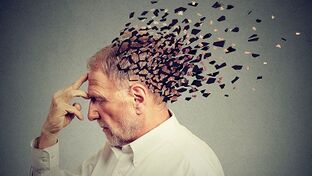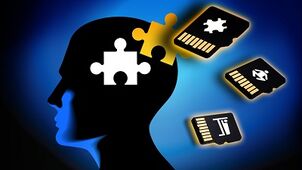
There are points of extreme opposition about medications to improve memory. Some say it is useful and helps to deal with increased intellectual stress, that it actually helps and is effective. Does it properly.
Others say that it is just a myth, that there is no benefit from taking these drugs, that it can be harmful and addictive for these drugs as well. Let's consider both points in more detail. Try and find out who is right.
bit about memory
Memory is a mental function of high neural activity, which is assisted by the accumulation, preservation and reproduction of information previously received. Memory allows you to preserve long-term information about the outside world or the body's reactions to any effect, And it also allows you to use this information for the correct organization of activities in the future.
Memory includes many different but related processes.
- memoirs- input of new data, sensations.
- storage- the accumulation of data, sensations, involves their processing and assimilation. This process allows a person to learn, develop his thinking and speech.
- Reproduction and Recognition- Realization of elements, actions, sensations from the past. Reproduction is involuntary (elements "float" in a person's mind without their will and efforts) and arbitrary.
- forgetting- loss of ability to reproduce and identify previously recalled elements. This can be temporary or permanent. An incomplete mistake is when information is re-presented. Goes or is identified with the error or part.
Basic type of memory
There are many types and subtypes in memory classification. Let's talk about its main types.
- sensory memory- Protection of information from the senses after stimulating them.
- tactile memory- Protection of information from receptors resulting from touch.
- Motor Memory- While saving information about movement, many may remember that there are movements that they perform automatically.
- Semantic memory- saving information about facts, for example, stories learned, dates, multiplication tables.
- short term memory- saving information for a short time. A small amount.
- Long term memory- Storing information indefinitely including whole life.
rules of memory

Some people know that there are many rules of memory. This is not an invention of the author, but a realistically established and scientifically proven pattern.
- The rule of duplication- The information is remembered better if it is repeated multiple times.
- Law of Interest- If a person is interested in information, he will remember it faster and better.
- the edge of the law- The information given at the beginning and at the end is best remembered.
- The Law of Comprehension- If the information is deeply understood, it will be better remembered.
- The optimal line length rule- The amount of memorable information should not exceed the amount of short-term memory.
- Establishment Law- A person who has given himself such an establishment that he needs to remember this or that information, will remember it faster and better.
- Rule of Prohibition- When remembering similar concepts, the old information "overlaps" with the new.
- The Law of Context- When things associated with already familiar concepts can be recalled, it moves rapidly.
- Rule of action- If what is remembered is used in practice, remembering happens more efficiently and quickly.
These laws can be used if you want to remember something faster and better, as well as train your memory.
due to memory loss
- biological brain damage- acute disturbances of the brain circulation, traumatic brain injury, brain tumors.
- diseases of other organs and systems- diseases of the liver, cardiovascular system.
- external factors- a sharp change in the surrounding conditions of bad ecology, survival, stress, sleep disturbances.
- age-related changes in brain structure- Reduction in the number of internal connection connections.
- chronic intoxication- smoking, drug use, substance abuse, substance abuse (sedative, tranquilizer).
treatment of memory disorders
Medications are not immediately prescribed if memory improvement is needed. They first try to implement non-pharmaceutical methods. These include:
- moves faster in strong air. This increases oxygen access to the brain, thereby improving the efficiency of its work.
- normalize sleepand awakening.
- evening training- the habit of remembering all the events of the day in reverse order, ie firstly, what happened in the evening, and finally - remembering the events of the morning, an unusual trainingIt is better to do this before going to bed, lying in bed.
- positive attitude, don't focus on it- don't think that you have a bad memory, nobody has canceled the effect of self-hypnosis. If at some point youCan't remember something, so don't worry, don't get angry, but just get distracted, do something else, and then try to remember what you forgot.
- Daily Training- Solve crosswords, puzzles, scanners.
- education- learn poetry, foreign language, do it regularly, gradually increase the amount of material you learn.
Medication for memory loss

It is clear that learning poetry, a foreign language, is not easy to solve puzzles, you need to "stress", allocate extra time to walk and solve puzzles, which is a working. The person practically does not have.
It is very easy to take a pill, calm down and hope for the magic power of medicine - immediately your memory will improve and you won't have to do anything! Residents of the modern city are so lazy and spoiled by the fruits of civilization that now some people are very purposeful and want to spend their time and energy on training memory. So a person is looking for answers to his question - to improve memoryAre the pills present?
So, let's consider two opposite opinions on this matter:
positive opinion
Proponents of the use of these funds say that many drugs help to improve the blood supply to brain cells, thereby improving their nutrition and supplying more oxygen, which metabolizes neurons in metabolic processes. Improves.
Nootropics and drugs that improve the rheological properties of the blood.
Herbal preparations have become widespread, which not only improve metabolic processes in neurons by themselves, but also increase the effects of nootropic drugs.
But it should be remembered that any (absolutely any) drug has its contraindications and side effects, so it should only be prescribed by a doctor in each specific clinical case.
negative opinion
According to many experts, the coin also has a downside. Many years ago, experts were surprised by the question - are these drugs effective or is it just a placebo effect?
As a result of several studies, the effectiveness of nootropics has not been proven. There is no evidence that they have a beneficial effect on memory. A small study on the effectiveness of medications has shown little effect on them. Is, but not in serious cases.
Traditional methods and herbal preparations, such as ginseng, vitamin E, are practically no research. The basis of the evidence is only for the use of herbal medicines in dementia patients. But no data on the effectiveness of use in relatively healthy peopleis.
In conclusion, I would like to say that when thinking about which medicines are best to improve memory, do not forget that they should be prescribed by a doctor. And the doctor also in each case. Effectiveness should be evaluated. Do not rely on the advice of friends, neighbors or relatives.
If you feel that your memory is impaired, see a neurologist. Maybe this is not the problem at all, it can be distracting, some other problems may occur. It is also necessary to find out the cause of this condition. And this can only be done by a qualified doctor.







































































